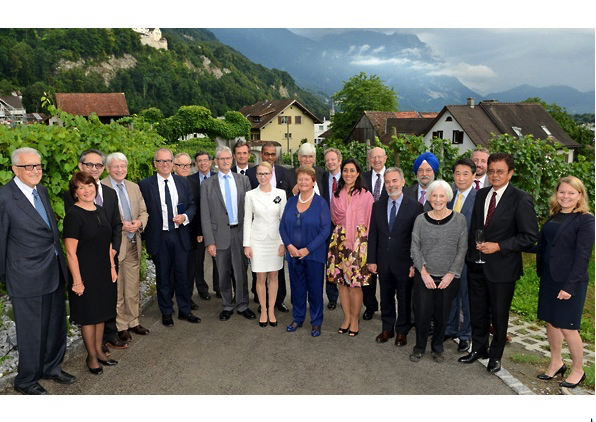FREE FLOW OF INFORMATION
A press release from The Elders
As the UN celebrates its 70th year, three Elders travelled to Liechtenstein to participate in high-level discussions on strengthening the organisation with a distinguished and diverse group of experts.

The Elders met in Liechtenstein on 5-6 September at the invitation of Foreign Minister Aurelia Frick to discuss proposals on strengthening the United Nations in its 70th anniversary year to ensure it remains “fit for purpose”.
Gro Harlem Brundtland, Deputy Chair of The Elders, led the delegation together with Lakhdar Brahimi and Martti Ahtisaari, and held wide-ranging discussions with ministers from Liechtenstein and other UN states, including several UN Permanent Representatives and former officials.
The discussions follow the launch of The Elders’ “Stronger UN” initiative at the Munich Security Conference in February 2015, which calls for four fundamental changes to the way the organisation operates: enlargement of the UN Security Council, a new agreement on UNSC veto restraint to prevent mass atrocities, a transparent and accountable mechanism to elect the new UN Secretary-General, and greater involvement of civil society in UN processes and decision-making.
Gro Harlem Brundtland, Deputy Chair of The Elders, said:
“We have held excellent and substantial discussions on all aspects of strengthening the UN with a distinguished and diverse group of experts. The constructive ideas raised and debated should prompt further informed debate at the UN General Assembly later this month.”
“We are particularly grateful to Liechtenstein for hosting this event, and for its commitment to UN reform as a member of the Accountability, Coherence and Transparency Group (ACT) and its wider foreign policy priorities.”
“The UN is a vital part of our global security and governance infrastructure but it has to change – its present arrangements are neither normal nor reasonable. We hope that discussions such as these will generate sufficient political momentum that the key players within the UN system will view The Elders’ initiative for formal consideration.”
The Elders will discuss their proposals further in New York at the upcoming UN summit on the Sustainable Development Goals and the General Assembly.
Can the UN help move the world toward a culture of peace?
The following comes from the CPNN Coordinator’s blog of October 2012
The United Nations and the Culture of Peace
My ten years working in the United Nations system left me with a sweet and sour taste: the sweet side was the universality of the UN, both its staff and mandate, and its great significance for raising the consciousness of the peoples of the world; the sour side was the jealousy of the Member States who make sure that the UN does not encroach on their freedom to rule over their own citizens, as well as people in other countries that they may dominate through neo-colonial relations. This became crystal-clear to me when the United States delegate, during the informal meetings of the UN General Assembly in 1999, opposed the Declaration and Programme of Action on a Culture of Peace, saying that it would make it more difficult for them to start a war. In fact, throughout history, war (call it “defense” if you prefer) has always been the most fundamental “right” of the state
With this in mind, I have been pleasantly surprised by the extent to which the UN system has once again taken up the culture of peace as a priority, as shown in this month’s CPNN bulletin, just as it was a priority in the Year 2000 when I was the director of the UN International Year for the Culture of Peace
Of course, this does not happen by chance, and great credit belongs to two men who played key roles for the Year 2000, Federico Mayor Zaragoza, who made the culture of peace a priority of UNESCO, and Anwarul Chowdhury, who played the role of midwife at the UN General Assembly, guiding the culture of peace resolution through nine months of opposition by the powerful states. Once again, this last month, these two men motivated and spoke eloquently at the High Level Forum on a Culture of Peace at the UN
As always it was the countries of the South who supported the initiative (see the CPNN article of September 24 and its discussion), but at least this month it was not blocked by the powerful states
In fact, it is my impression that the powerful states pay less and less attention to the United Nations. When there was a financial crisis a few years ago, the powerful states did not turn to the UN agencies , the World Bank and the International Monetary Fund, but set up their own temporary system of finance ministers, and when it came time for the review of nuclear non-proliferation, President Obama held his own meeting with heads of state in Washington and ignored the UN conference where the only head of state to speak was that of Iran. And the US has pulled out of UNESCO entirely, forcing drastic cuts in its budget
In fact, the lack of attention by the powerful states may provide the UN system with an opportunity to push the agenda of the culture of peace without their opposition – let us hope that the UN can take advantage of this
Of course, in the long run, the UN, or any other institution, cannot mandate a culture of peace; instead, the culture of peace can only grow from the consciousness, both understanding and action, of the peoples of the world (see last month’s blog below). That’s why the role of the UN for consciousnes-raising is ultimately its greatest contribution!